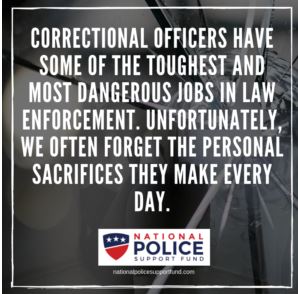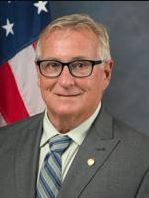
The Thin Silver Line Alliance Provides Leadership on Essential First Step to Solve Florida's "Crisis in Corrections"

Florida Correctional Officers Are Both Members of Law Enforcement & Emergency First Responders

Representative Mooney has committed to continue to be a Strong Advocate for Florida's Correctional Officers & Sheriff's Detention Deputies
If Florida's Leaders are Serious About Solving the State's "Crisis in Corrections" Proper Recognition of Florida Correctional Officers Must Be The First Step.
KEY WEST, FL, UNITED STATES OF AMERICA, June 18, 2023/EINPresswire.com/ -- If Governor DeSantis, Representatives of the Florida legislature, and Florida's law enforcement leaders are serious about solving Florida's well publicized "Crisis in Corrections" then the first step must be to officially recognize Florida's Sworn Correctional Officers that work at either the state level for the Florida Department of Corrections or at the county level for Florida's Sheriffs as Detention Deputies as both the members of law enforcement and as the emergency first responders that they legally are according to several state legal precedents.
"My Dad was a successful business leader and once told me, If you want to lead, the first thing you have to do is get way behind your people." Being recognized as members of law enforcement and as emergency first responders is important to the selfless men and women that serve as Florida Correctional Officers. Establishing and maintaining law enforcement officer presence is of the highest and most critical importance to enabling Florida's Correctional Officers to serve their critical duty of providing care, custody and control inside of Florida's prisons and jails. Everybody's safety depends on Florida's Correctional Officers being able to maintain the law and order in our state's prisons and jails and Florida leaders must provide them with this critical support by recognizing them for who they are and the job they do.
Florida Legal Precedents Defining Correctional Officers as Law Enforcement Officers & Emergency First Responders
On June 1st 1982, Florida Attorney Jim Smith responded in Advisory Legal Opinion - AGO 82-40 to The Honorable Louie L. Wainwright Secretary of the Department of Corrections at the time with his opinion as to whether the exemption to the Public Records Law specified by s. 119.07(3)(k), F.S., for law enforcement officers applies to correctional officers? Smith goes on to state “the only question is whether correctional officers are included within the term "law enforcement personnel." Nowhere does Ch. 119 define this term for the purposes of the Public Records Law; therefore the meaning must be construed in light of its ordinary meaning and in view of statutory definitions of related terms contained in the Florida Statutes. Attorney General Opinion 76-05 concluded that the supervision of prisoners and their activities during the terms of their confinement can be classified as a police function in that they keep the public peace. Correctional officers also have the power to make arrests. See, s. 843.04(1) (which requires prison guards to arrest any escaped convict) and s. 944.39 (which authorizes any "peace officer or any . . . guard of the department" to arrest without warrant persons interfering with prisoner work or the discipline or good conduct of prisoners). It would appear that correctional officers, as defined in s. 943.10(2) and newly amended s. 112.531(2), are just as much "law enforcement officers" within the scope of their jurisdiction as are sheriffs and municipal police officers within their respective jurisdictions."
Additionally, Smith notes that "Part VI, Ch. 112, is but one of many statutes that treat or define "law enforcement officers" and "correctional officers" in a similar way. Section 790.001(8), in defining "law enforcement officers" includes both (a) employees of any state agency that have the authority to make arrests and (d) employees of the state prisons or correctional systems who have been designated as law enforcement officers by the Department of Corrections or by a superintendent of an institution. For the purposes of Part I, Ch. 112, s. 112.19(1)(c) includes within the meaning of "law enforcement officer" any full-time officer whose duties require him to transport, handle, or guard persons arrested for, charged with or convicted of violations of the criminal laws. See also, s. 121.0515(2)(a) and (c) (defining the criteria for designation as a "special risk member" of the Florida Retirement System, and including both law enforcement officers and correctional officers), In view of the above statutes and authorities, Attorney General Jim Smith was persuaded in AGO 82-40 that correctional officers are included within the term "law enforcement personnel"."
In 2019, the Florida Senate worked on H.B.7125 – Administration of Justice, an omnibus criminal justice reform for the state criminal justice system. Florida statute 790.052 was re-written. It now reads in part: “(b) All persons holding an active certification from the Criminal Justice Standards and Training Commission (CJSTC) as a law enforcement officer or a correctional officer as defined in s. 943.10(1), (2), (6), (7), (8), or (9) meet the definition of “qualified law enforcement officer” in 18 U.S.C. s. 926B(c).” 18 U.S.C.s. 926B is the federal code for LEOSA and, as we can see from the above change, Florida-certified correctional officers are now classified as qualified law enforcement officers. This allows these officers who meet the qualifications of LEOSA to carry concealed nationwide just as our law enforcement partners who serve as Police Officers or Deputy Sheriffs.
In 2022, according to lines 122-124 of CS/CS/HB 1563: Homestead Property Tax Exemptions for Classroom Teachers, Law Enforcement Officers, Firefighters, Emergency Medical Technicians, Paramedics, Child Welfare Professionals, and Servicemembers the term "Law enforcement officer" means a law enforcement officer or correctional officer as those terms are defined in s. 943.10(1) and (2).” On 6/24/2022, CS/CS/HB 1563 was approved by Governor DeSantis.
According to Fla. Admin. Code R. 33-208.001 “(1) Designation as Law Enforcement Officers. (a) The following officers and employees of the Department of Corrections are designated as law enforcement officers: Secretary; Deputy Secretary; Assistant Secretary of Community Corrections; Assistant Secretary of Institutions; Deputy Assistant Secretary of Institutions; Regional Directors; Correctional Security Administrator; wardens of all institutions and community facilities; the staff of all institutions and community facilities, including road prisons, vocational centers, community correctional centers, women's adjustment centers and probation and restitution centers, excluding clerical and secretarial employees; Community Corrections Regional Directors; Circuit Administrators, Supervisors and Officers; Inspector General; Deputy Inspector General; and Correctional Inspectors.”
According to the HEROS program endorsed by Governor DeSantis in 2020 and the Helping Heroes program launched by AG Moody in 2023, “licensed emergency responders include law enforcement officers, firefighters, paramedics, correctional officers and correctional-probation officers”.
Jeffrey Snipes
The Thin Silver Line Alliance
+1 305-395-0095
thethinsilverline@gmail.com
Visit us on social media:
Facebook
YouTube
Other
Florida Correctional Officers Are Law Enforcement & First Responders
EIN Presswire does not exercise editorial control over third-party content provided, uploaded, published, or distributed by users of EIN Presswire. We are a distributor, not a publisher, of 3rd party content. Such content may contain the views, opinions, statements, offers, and other material of the respective users, suppliers, participants, or authors.

